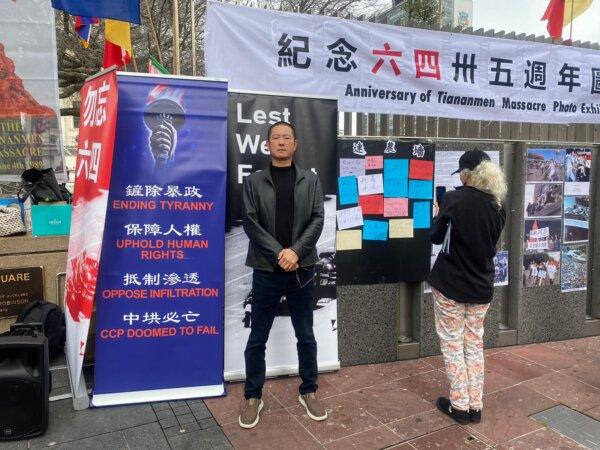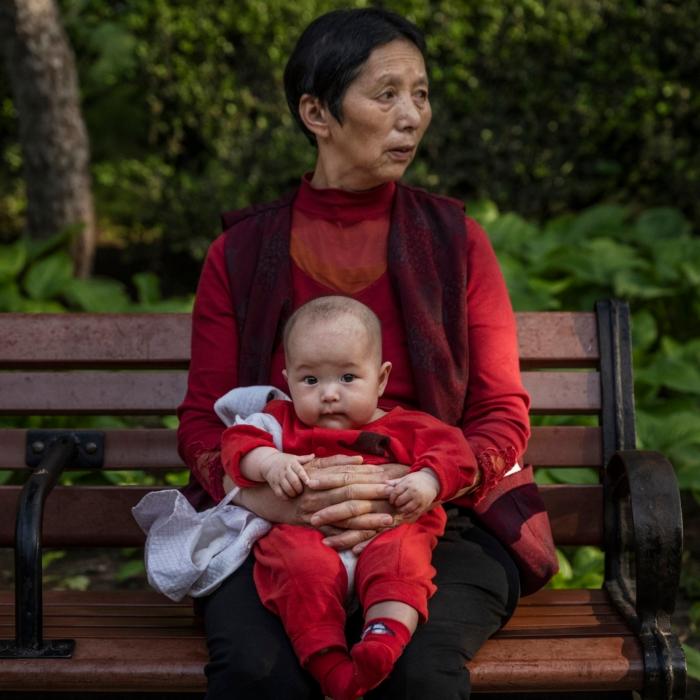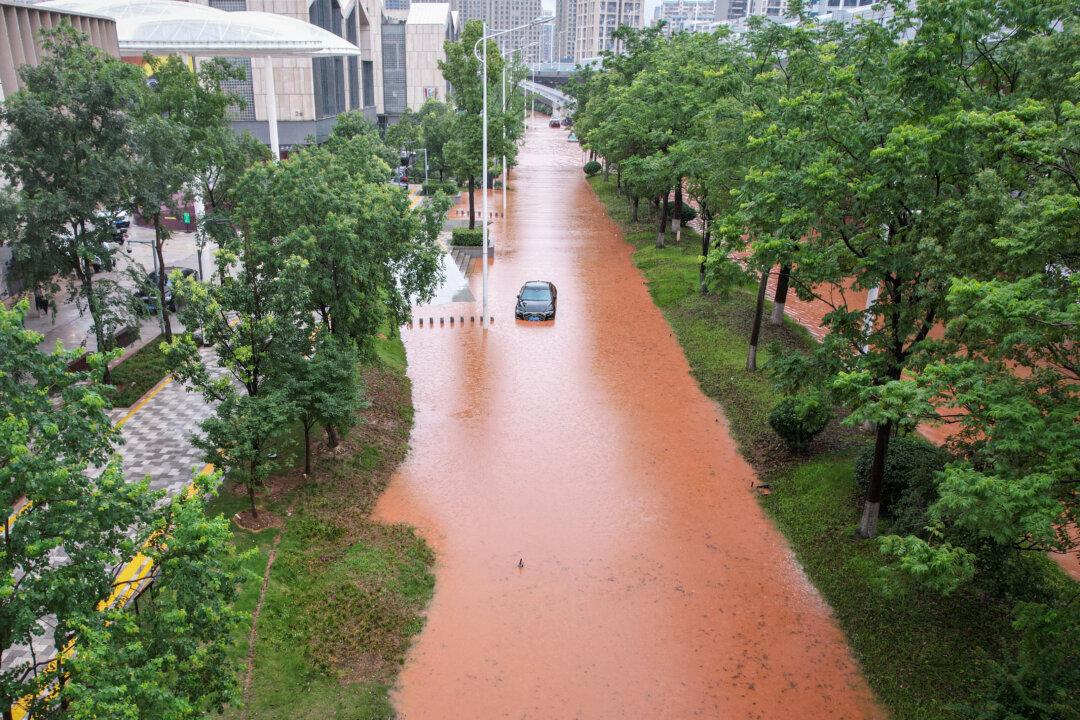A Chinese veteran recently fled China to start a new life in New Zealand to escape persecution by the Chinese Communist Party (CCP). He witnessed firsthand the corruption in the military and the CCP’s abuses through its one-chid policy and treatment of veterans.
Military Corruption
Zhang Heli is a native of China’s eastern province of Anhui.Upon witnessing the peaceful student-led pro-democracy protests in Tiananmen Square in 1989 and the CCP’s violent suppression of the protesters, he says he began to see the brutal nature of the CCP. However, Mr. Zhang said that his understanding of the CCP was limited at the time.
Nevertheless, he said ever since he enlisted in the military in 1990, he gradually gained a deeper understanding of the Chinese regime’s corruption.
Mr. Zhang, who was 18 then, was initially assigned to a security unit at an air force command headquarters, where he often witnessed apparent favoritism and bribery among the personnel.
Mr. Zhang was then transferred to a warehouse in Yunnan, where he saw officers leveraging military resources for personal gain. For example, he shared how he was bribed and eventually reassigned to a different unit because he objected to the unauthorized sale of radar equipment from decommissioned vehicles.
Atrocities of One-Child Policy
As a clerk in the party and government affairs department, Mr. Zhang assisted town officials with enforcing the CCP’s “one-child policy,” which was instituted in 1979.Mr. Zhang recalled seeing garbage bags filled with aborted babies at the entrance of one operating room at a family planning facility. “The horrifying sight haunted me for days ... three large bags,” he recalled.
He witnessed several local authorities and staff from the family planning office forcibly sterilizing a woman. “Each town had a family planning office, with walls as high as detention centers, where pregnant women were detained for compulsory classes [on population control],'” he told The Epoch Times.
“When villagers were busy harvesting wheat, authorities were occupied enforcing family planning policies,” Mr. Zhang recounted. “If a family had financial means, they could bribe the CCP committee secretary, officials from the family planning office, or other influential figures in the local government to secure exemptions [to avoid abortion].”
He was appalled by how ordinary citizens were treated unjustly. “Why were officials’ families and their relatives merely fined for exceeding birth limits, while the children of ordinary people had to suffer and die?”
In 2000, the CCP launched institutional reforms at the township level, beginning with Anhui as a pilot area where government employees were required to take an exam. The reforms aimed to simplify the administrative structure of local governments.
Mr. Zhang said taking the exam was straightforward, but to stay employed, one had to pay the party committee secretary 20,000 yuan (about $2,400).
But he refused to comply with the authorities and recalled telling them: “I won’t pay. I won’t go to work anymore. I quit.”
He then moved to the eastern coastal province of Zhejiang, where he began his wholesale business in April 2000. He faced numerous challenges, he said, including harassment from market competitors and a lack of law enforcement. He recalled being seriously injured in a confrontation, but local police did nothing about the incident.
Despite these adversities, Mr. Zhang said, he was able to provide a stable life for his family by buying a house and a car after eight years of running his own business.

CCP’s Oppression
Mr. Zhang said he felt oppressed by the authorities ever since he supported veterans and joined their protests against the CCP’s injustices.Three months later, in June, China’s veteran protest was in full swing. Thousands of veterans from across the country assembled in Zhenjiang city of Jiangsu Province to support their comrades in advocating for their rights, only to face violent suppression by authorities who deployed tens of thousands of police officers.
Mr. Zhang said he was clear about not supporting or benefiting from the CCP’s agenda. In August 2018, he joined a local veterans’ protest, and in the following month, he traveled to the Ministry of Veterans Affairs in Beijing to address veterans’ grievances.
In October that year, veteran protests lasted several days in Pingdu city in Shandong. They were forcibly dispersed by police using pepper spray and batons.
“The Pingdu incident was our final battle,” said Mr. Zhang. However, he and other veterans couldn’t join the protests because authorities limited the number of people entering the city at the time.
Mr. Zhang pointed out that the authorities fabricate charges. “Many of my WeChat friends were charged with ‘picking quarrels and provoking troubles’ and sentenced to two years, and those who didn’t plead guilty received four-year sentences,” he said.
On June 4, 2019, Mr. Zhang’s comment on WeChat commemorating the 20th anniversary of the 1989 Tiananmen Square massacre got him arrested within four hours of posting the message. Mr. Zhang said the police threatened him, saying, “We can make you disappear any time so your family will never find you.” He was detained between June 20 and April 30 of the following year.
According to the court verdict released on May 22, 2020, Mr. Zhang was sentenced to two years in prison with a three-year probation for posting content in WeChat groups that “criticized the socialist system of China, the ruling party, and former national leaders.”
On May 10, 2023, he was released from prison, placed on probation, and prohibited from leaving his county for three years.
Mr. Zhang said he doesn’t regret upsetting the authorities. When his friends and fellow veterans asked him why he took such risks publicly denouncing the CCP, he recalled telling them: “I have a comfortable life because of my own efforts. However, our society remains unjust, with the CCP committing egregious crimes, including crimes against humanity. How can I stay silent? How can I live a happy life amid these realities?
‘Cultural Revolution 2.0’
Mr. Zhang called out the CCP’s strict COVID-19 measures, calling it “Cultural Revolution 2.0.” On Jan. 23, 2020, Beijing began to implement lockdowns in major cities across the country, mandating nucleic acid testing and vaccinations and ordering the arrest and detention of dissenters.“This kind of nationwide lockdown and suppression of the common people is the CCP’s version of a Cultural Revolution 2.0. It means increasingly controlling the common people, who have fewer and fewer freedoms,” he said.
“At first, I didn’t get vaccinated nor undergo a nucleic acid test. But later, it became terrifying. I feared being detained and sent back to prison. So I was the first to arrive at the nucleic acid testing site every morning at five o'clock. I opened my mouth, and as soon as they swabbed me, I felt like vomiting,” he shared.
“I know people in the medical system who were falsifying results, and I know they [the CCP] were targeting the common people,” he added.
Mr. Zhang said adults and children in his apartment building would go to the lobby every day for nucleic acid tests for several months.
A New Life
In the spring of 2023, Mr. Zhang saw videos of people entering the United States illegally through its southern border. He recalled telling his friends at the time: “I have to leave China! I must go underground!”He said he was worried he could be arrested at any time, since he was on probation and constantly watched. “I'd be their primary target. What laws do they adhere to? It’s all tyranny and despotism,” he said.
He thought it was too dangerous to try to get to the U.S. border, so he decided to go to New Zealand instead.
In July of that year, Mr. Zhang and his 15-year-old son fled to New Zealand, where they are currently applying for asylum. His wife and their other son remain in China.
Mr. Zhang concluded the interview with The Epoch Times by sharing what he told the authorities during his detention between 2019 and 2020 for commenting on the 1989 Tiananmen Square massacre. “I have not betrayed China; I love this country very much,” he recalled saying. “Why did I criticize the CCP? Why did I challenge it? Because I want to make this country better. What crime have I committed?”






